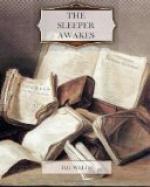“What news of the flying stages?” he asked.
“The people of the south-west wards are ready.”
“Ready!”
He turned impatiently to the blank circles of the lenses again.
“I suppose it must be a sort of speech. Would to God I knew certainly the thing that should be said! Aeroplanes at Madrid! They must have started before the main fleet.
“Oh! what can it matter whether I speak well or ill?” he said, and felt the light grow brighter.
He had framed some vague sentence of democratic sentiment when suddenly doubts overwhelmed him. His belief in his heroic quality and calling he found had altogether lost its assured conviction. The picture of a little strutting futility in a windy waste of incomprehensible destinies replaced it. Abruptly it was perfectly clear to him that this revolt against Ostrog was premature, foredoomed to failure, the impulse of passionate inadequacy against inevitable things. He thought of that swift flight of aeroplanes like the swoop of Fate towards him. He was astonished that he could have seen things in any other light. In that final emergency he debated, thrust debate resolutely aside, determined at all costs to go through with the thing he had undertaken. And he could find no word to begin. Even as he stood, awkward, hesitating, with an indiscreet apology for his inability trembling on his lips, came the noise of many people crying out, the running to and fro of feet. “Wait,” cried someone, and a door opened. Graham turned, and the watching lights waned.
Through the open doorway he saw a slight girlish figure approaching. His heart leapt. It was Helen Wotton. The man in yellow came out of the nearer shadows into the circle of light.
“This is the girl who told us what Ostrog had done,” he said.
She came in very quietly, and stood still, as if she did not want to interrupt Graham’s eloquence.... But his doubts and questionings fled before her presence. He remembered the things that he had meant to say. He faced the cameras again and the light about him grew brighter. He turned back to her.
“You have helped me,” he said lamely—“helped me very much.... This is very difficult.”
He paused. He addressed himself to the unseen multitudes who stared upon him through those grotesque black eyes. At first he spoke slowly.
“Men and women of the new age,” he said; “you have arisen to do battle for the race!... There is no easy victory before us.”
He stopped to gather words. He wished passionately for the gift of moving speech.
“This night is a beginning,” he said. “This battle that is coming, this battle that rushes upon us to-night, is only a beginning. All your lives, it may be, you must fight. Take no thought though I am beaten, though I am utterly overthrown. I think I may be overthrown.”
He found the thing in his mind too vague for words. He paused momentarily, and broke into vague exhortations, and then a rush of speech came upon him. Much that he said was but the humanitarian commonplace of a vanished age, but the conviction of his voice touched it to vitality. He stated the case of the old days to the people of the new age, to the girl at his side.




